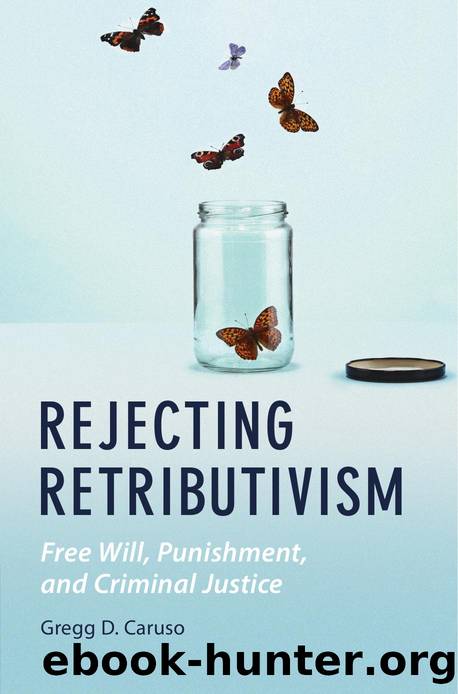Rejecting Retributivism by Caruso Gregg D.;

Author:Caruso, Gregg D.; [Caruso, Gregg D.;]
Language: spa
Format: epub
Published: 2021-01-25T12:11:44+00:00
Sidgwick, and Ross (see Feldman and Skow 2015). There are, however, several
prominent theories of justice that are not desertist, including the well-known
theory of John Rawls (1971). In A Theory of Justice, Rawls stresses the fact that
inequalities of birth are types of underserved discrimination and claims that
desert does not apply to oneâs place in the distribution of native endowments,
oneâs initial starting point in society, the familial or social circumstances into
which one is born, or to the superior character that enables one to put forth the
effort to develop oneâs abilities. Rawlsâ theory therefore suggests a metaphysical
argument against desert, according to which âsince most of who we are and what
we do is greatly influenced by underserved native endowments and by the
undeserved circumstances into which we are born, one cannot deserve anything,
or, at best, one can deserve very littleâ (Celello 2014). For Rawls, desert should
not have any role in distributive justice, since these underserved factors have
a major influence on all would-be desert bases (Sher 1987: 22ff; cf. Moriarty
2002: 136â137).
6.1 The Public HealthâQuarantine Model
201
Another philosopher who proposes a non-desertist theory of justice is David
Hume (1983). And as Peter Celello explains, Humeâs insights can be used to develop
epistemological and pragmatic arguments against desert:
Hume argued that since humans are both fallible in their knowledge of the factors
that would establish othersâ merit and prone to overestimating their own merit,
distributive schemes based on merit could not result in determinate rules of
conduct and would be utterly destructive to society (Hume [1983], 27). This
thinking is captured in the epistemological and pragmatic argument against desert.
According to the epistemological argument, since we cannot know the specific
details of the lives of every member in a community or society, we cannot accurately
treat people according to their desert . . . The pragmatic argument against desert is
that, regardless of whether we could gain the knowledge needed to treat people
according to their desert accurately, attempting to do so would have overriding
negative consequences. Such negative consequences could include expending
large amounts of time and resources in an effort to make accurate desert judgments
and, perhaps, losses of personal privacy as one delves into the details of othersâ lives.
Both the epistemological and pragmatic arguments must be accounted for when
attempting to explain how a true meritocracy could and should be arranged. (2014)
These metaphysical, epistemic, and pragmatic considerations count strongly against
desertist theories of justice. And Rawlsâs theory of justice, which he calls justice as
fairness, provides one potential non-desertist approach to social and distributive
justice.
On the other end of the political spectrum, political libertarian accounts of justice
also tend to be non-desertist. For the political libertarian, the primary goal of justice
is the protection of negative liberty â that is, the absence of constraints on an
individualâs actions. In Anarchy, State, and Utopia (1974), Robert Nozick advances
one of the best-known libertarian accounts of justice â his entitlement theory of
justice. On this view, a just distribution is one where each person is entitled to the
holdings that he/she possesses according to the principles of justice in acquisition,
transfer, and rectification. Nozick describes his entitlement theory as âhistorical,â
because it determines the justice
Download
This site does not store any files on its server. We only index and link to content provided by other sites. Please contact the content providers to delete copyright contents if any and email us, we'll remove relevant links or contents immediately.
Navigation and Map Reading by K Andrew(4553)
Spare by Prince Harry The Duke of Sussex(4195)
Tuesdays with Morrie by Mitch Albom(3832)
Cracking the GRE Premium Edition with 6 Practice Tests, 2015 (Graduate School Test Preparation) by Princeton Review(3595)
What It Really Takes to Get Into Ivy League and Other Highly Selective Colleges by Hughes Chuck(3220)
Goodbye Paradise(2957)
Never by Ken Follett(2878)
Pledged by Alexandra Robbins(2790)
Kick Ass in College: Highest Rated "How to Study in College" Book | 77 Ninja Study Skills Tips and Career Strategies | Motivational for College Students: A Guerrilla Guide to College Success by Fox Gunnar(2719)
A Dictionary of Sociology by Unknown(2516)
Graduate Admissions Essays, Fourth Edition: Write Your Way into the Graduate School of Your Choice (Graduate Admissions Essays: Write Your Way Into the) by Asher Donald(2474)
Sapiens and Homo Deus by Yuval Noah Harari(2411)
Get into Any College by Tanabe Gen Tanabe Kelly(2383)
Zero to Make by David Lang(2347)
The Social Psychology of Inequality by Unknown(2309)
Machine Learning at Scale with H2O by Gregory Keys | David Whiting(2283)
500 Must-Know AP Microeconomics/Macroeconomics Questions(2239)
Fairy Tale by Stephen King(2062)
Will by Will Smith(2039)
